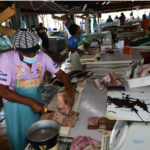A regional economist has cast doubt on the accuracy of Barbados’ official inflation figures, suggesting they may significantly understate the true cost of living for many households.
Head of the Economic Research Unit of First Citizens Bank, Vangie Bhagoo-Ramrattan said the published low inflation data may be incorrect concerning the prices consumers are paying to put food on the table.
Bhagoo-Ramrattan, the main presenter at a webinar on Friday on the Economic Outlook for Barbados for 2025, first outlined how the authorities measure inflation before she sought to back up her conclusions.
The senior economist, who also examined the global and regional situation, said that in Barbados in particular, inflation is measured by the retail price index (RPI).
“The retail price index measures changes in the retail prices of a fixed basket of goods and services, and it should represent spending patterns of the majority of households in Barbados. That’s how the inflation rate is calculated; they use the basket to find the percentage change, and it is also weighted. So, the RPI in Barbados is weighted. Food and non-alcoholic beverages accounted for the largest — about 22 per cent — followed by housing, water and electricity, things like that, 15 per cent; and then transport is the third, which is 13.5 per cent,” she explained during the webinar organised by the Institute of Chartered Accountants of Barbados (ICAB) in collaboration with First Citizens Bank.
“So, there may be a disconnect between . . . so the disconnect may possibly stem from the calculation of the inflation rate, in that the items that make up the basket, may not accurately reflect current realities. So, the basket may have been around since 2016. So, obviously, consumer tastes would change over time. So, that might be part of it, the calculation of it,” she argued.
Bhagoo-Ramrattan then turned her attention to the related issue of the purchasing power of consumers, while pointing to the concept of inflation or the definition of inflation.
The economic researcher reasoned that even if Barbados recorded an inflation rate of one per cent, though that appeared low, it still meant that prices were rising at the rate of one per cent.
“Now, the problem,” she suggested, “may be that the pace at which your wages are increasing, it’s not keeping up with the pace of inflation. So, your purchasing power is still being eroded. So, those are some of the reasons why there may be a disconnect in terms of feeling a low rate of inflation that is quoted by . . . which are published.”
In its review of the economy for 2024, the Central Bank of Barbados reported that “favourable” price dynamics reduced inflation significantly during that period.
The bank pointed out that domestic inflation slowed to an estimated 1.4 per cent on a 12-month moving average basis by the end of the year, representing a 1.8 percentage point decline from 2023.
The regulator is also projecting that inflation will remain low, stabilising around two per cent, as global commodity prices ease. (EJ)
The post Regional economist questions local inflation figures accuracy appeared first on Barbados Today.


